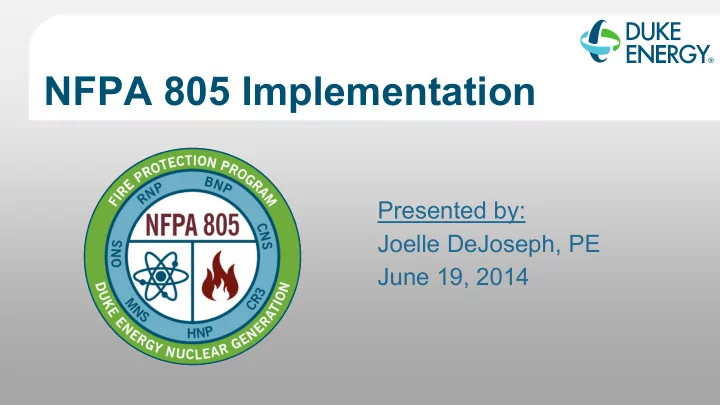

NFPA 805 Implementation Presented by: Joelle DeJoseph, PE June 19, 2014
Duke Energy Status Entire Duke Operating Fleet Adopting 50.48(c) – NFPA 805 Harris and Oconee were pilot plants for NFPA 805 Harris effectively implemented NFPA 805 Oconee implementation still in progress Brunswick submitted NFPA 805 License Amendment Request (LAR) in September 25, 2012 Robinson, Catawba, McGuire submitted NFPA 805 LARs in September 2013 June 19, 2014 2
Transition Experience Resource intensive LAR preparation and Request for Additional Information (RAI) process Fire PRA is driving factor relative to cost and schedule Teaching plant to think differently about fire Enhanced knowledge of fire scenarios and the impact to the plant Recognize significance of fire risk to the overall risk to the plant June 19, 2014 3
Implementation Experience More comprehensive understanding of the physical plant Documentation of cable routings Realistic fire scenarios versus whole room burn up “insights” Plant response to fires At Harris and Oconee, we are managing the specific fire scenarios and its impact to the plant June 19, 2014 4
Safety Improvements NFPA 805 Modifications – Incipient Detection June 19, 2014 5
Safety Improvements NFPA 805 Modifications – 3-hour Cable June 19, 2014 6
Safety Improvements NFPA 805 Modifications – Alternate Seal Injection System for Reactor Coolant Pump Seals June 19, 2014 7
Safety Improvements Addressed Multiple Spurious Operations (MSOs) MSOs were modeled and treated as Variances from Deterministic Requirements (VFDRs) Disposition of most VFDRs using the performance based approach Reduction in the number of manual actions required by an operator during a fire event June 19, 2014 8
Program Maintenance More Informed Maintenance of the Fire Protection Program Fire Protection Program Change Process Transient Combustibles Abnormal Operating Procedures Compensatory Measures NFPA 805 Monitoring June 19, 2014 9
Mutual Fire Protection Insights Management of Plant Changes Insights from fire scenarios are used during development of plant modifications Transient Combustible Control Program Improvements Control of stand-off distances from plant equipment June 19, 2014 10
Challenges Moving Forward Consistent program implementation throughout the industry Understanding that NFPA 805 is risk informed, not risk based Continual improvement of the processes NRC Frequently Asked Questions (FAQ) process Memorandum of Understanding (MOU) Industry Benchmarking and Lessons Learned Sharing lessons learned from the NRC inspection process Conservatisms in the fire PRA may result in unintended consequences when combined with other PRAs (internal events, seismic, flooding) June 19, 2014 11
June 19, 2014 12
Recommend
More recommend